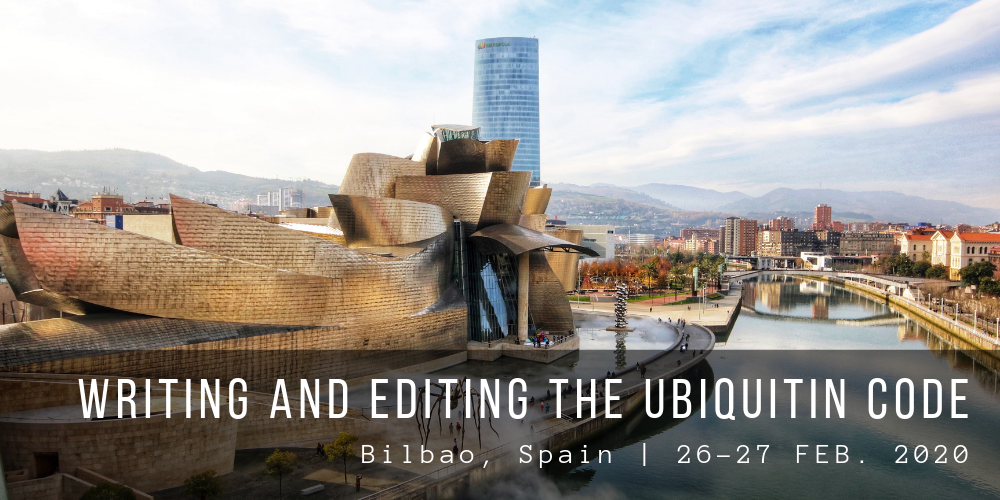
|
|
|
|
WELCOME Post-translational modifications (PTM) by members of the ubiquitin family are at the heart of almost every biological process, including regulation of protein levels, localization, and quality control. Defects in this protein homeostasis (proteostasis) can result in developmental anomalies and disease. An intricate interplay exists among the ubiquitin-family members, with diverse chains and linkages that constitutes a “ubiquitin code”, the full meaning of which is largely unknown. Fundamental research on the ubiquitin code continues to grow, with the pharmaceutical industry taking aim at potential targets in the proteostasis area for novel therapies.
“Writing and Editing the Ubiquitin Code” is a one-and-a-half day symposium that will focus on how the code is written and edited through ligases and proteases, how the different modifications affect cell signaling, and how new technologies can be applied to analyze these modifications. Presentations will cover a wide range of topics, from genome instability and metabolic regulation, to cancer, neurodegeneration and infectious diseases. REGISTRATION DEADLINE 10 JAN. 2020 ABSTRACT SUBMISSION: 01 AUG. 2019 - 10 JAN. 2020 Click here to register or submit an abstract
Click here to download the programme Our promotional poster is still available here
ABOUT US
The University of the Basque Country / Euskal Herriko Unibertsitatea (UPV-EHU) is an integrating institution willing to produce knowledge, experience and research in order to forward them to the general public. The university research groups participates in various public and private projects. In addition, UPV-EHU collaborates with research centers, companies and institutions for the transfer of research results, scientific and technological cooperation and the establishment of strategic alliances in R&D. Follow us on Ehu.eus | Twitter | Facebook | Instagram
CIC bioGUNE is a key research center within the national and international scientific landscape and has emerged as a knowledge source in the area of health science. The cutting-edge scientific activity of CIC bioGUNE researchers explores the interface between Chemistry and Biomedicine, with emphasis on Structural, Molecular and Cell Biology. Two research programmes - "Molecular Recognition and Host-Pathogen Interactions" and "Metabolism and Cell Signaling in Disease" – are made up of more than a hundred scientists and technicians who concentrate on the molecular bases and mechanisms of disease to create new diagnostic methods and promote development of advanced therapies. Follow us on Cicbiogune.es | Twitter | Facebook
The French National Centre for Scientific Research (CNRS) is among the world's leading research institutions. Its scientists explore the living world, matter, the Universe, and the functioning of human societies in order to meet the major challenges of today and tomorrow. Internationally recognised for the excellence of its scientific research, the CNRS is a reference in the world of research and development, as well as for the general public. Follow us on cnrs.fr | Twitter | Facebook | Instagram
The Center of Excellence Severo Ochoa aims to fund and accredit public research centers and units on any areas that demonstrate scientific leadership and impact at global level, as well as active collaboration in their social and business environment. The Centers of Excellence Severo Ochoa are organizational structures with highly competitive strategic research programmes in the frontiers of knowledge. They are among the best in the world in their respective scientific areas. The evaluation and selection process is carried out by an independent international committee of prestigious scientists with high impact.
The UbiCODE Innovative Training Networkis composed of 11 research institutions across 5 countries in the EU conducting world-class research in post-translational modifications with ubiquitin and ubiquitin-like molecules. This European programme aims to train a new generation of creative, entrepreneurial and innovative early-stage researchers, able to face current and future challenges and to convert knowledge and ideas into products and services for economic and social benefit. This project has received funding from the European Union’s Horizon 2020 research and innovation programme under the Marie Skłodowska-Curie grant agreement No 765445. Follow us on Ubicode.eu | Twitter | Facebook | Instagram
UBIRed is a network committed to improve the quality, productivity and impact of the research groups in Spain specialised in the study ofubiquitin and UBL proteins and their roles in cell proliferation, differentiation and cancer. The expected impact of UBIRed is to develop strategies aiming at modulating UBL modification processes to better diagnose and/or cure those cancers in which UBLs conjugation is involved. In this manner, we expect to increase Spanish scientific leadership in this highly competitive field and to translate scientific knowledge into cutting-edge innovations that will improve human health. Follow us on Ubired.eu | Twitter
The TRIM-NET consortium is designed to bring together a multidisciplinary team that connects different expertise (genetics, biochemistry, molecular and cell biology, chemical biology, structural biology) across Europe to address TRIM proteins activity and to develop novel therapeutics for the treatment of different types of cancer, rare genetics diseases, neuromuscular pathologies, and neurodegenerative diseases. This project has received funding from the European Union’s Horizon 2020 research and innovation programme under the Marie Skłodowska-Curie grant agreement No 813599. Follow us on Trimnet.eu
The Spanish Ministry of Science, Innovation and Universities is the department of the Government of Spain responsible for the execution of the Government's policy regarding universities, scientific and technical research, technological development and innovation in all sectors, including the management of international relations in this area and the Spanish representation in programs, forums and international organizations, and the European Union of its competence. Follow us on Ciencia.gob.es | Twitter
The Marie Skłodowska-Curie actions (MSCA) are part of the European Commission's Horizon 2020 programme. They provide grants for all stages of researchers' careers - be they doctoral candidates or highly experienced researchers - and encourage transnational, intersectoral and interdisciplinary mobility. The MSCA enable research-focused organisations (universities, research centres, and companies) to host talented foreign researchers and to create strategic partnerships with leading institutions worldwide. |
| Online user: 2 | Privacy |

|







